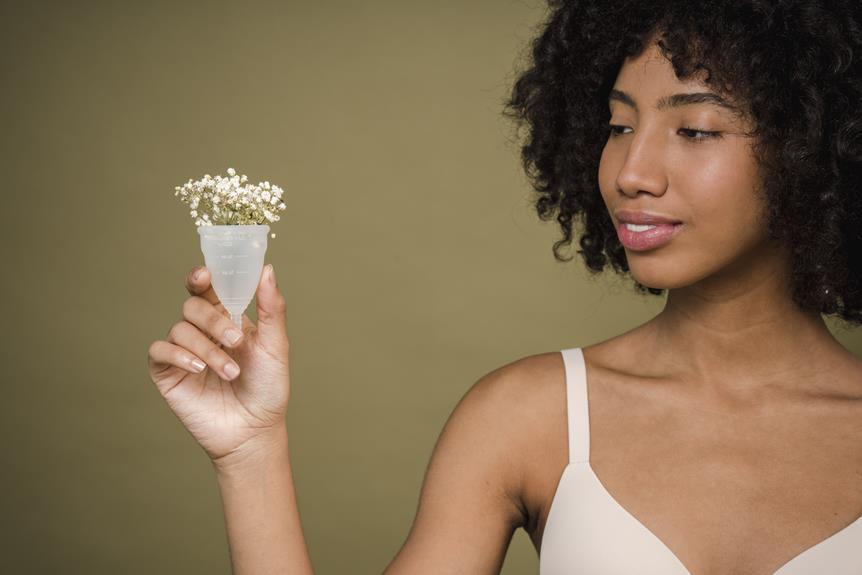Why Do Women Experience Menstrual Cramps, and How to Alleviate Them

Imagine a woman's body as a symphony, with each monthly cycle bringing its own set of harmonious and discordant notes.
One of the most commonly experienced dissonances is the dreaded menstrual cramps. These unwelcome companions can disrupt daily routines and hinder productivity.
But fear not, for there are ways to alleviate these pains and restore balance to the symphony of a woman's life.
In this article, we will explore the causes of menstrual cramps and share practical strategies to help women find relief and restore harmony to their bodies.
Key Takeaways
- Approximately 80% of women experience discomfort from menstrual cramps.
- Exercise can help relieve cramps by increasing blood flow and releasing endorphins.
- High levels of stress can intensify menstrual pain, so managing mental health through stress-reducing techniques is important.
- Hormonal imbalances, particularly high levels of prostaglandins, can cause increased pain during menstruation, but addressing hormonal imbalances can provide relief.
Understanding Menstrual Cramps: Causes and Symptoms
Many women experience moderate to severe menstrual cramps during their monthly period, with approximately 80% of women reporting some level of discomfort. Menstrual cramps can significantly impact a woman's daily activities and overall well-being. Understanding the causes and symptoms of menstrual cramps is crucial in finding effective ways to alleviate them.
One important aspect to consider is the relationship between menstrual cramps and exercise. While light to moderate exercise can help relieve cramps by increasing blood flow and releasing endorphins, intense workouts may worsen the pain. Finding the right balance is key to reaping the benefits of physical activity without exacerbating cramps.
Another factor that plays a role in menstrual cramps is stress. High levels of stress can lead to increased muscle tension and inflammation, intensifying menstrual pain. Managing mental health through stress-reducing techniques such as relaxation exercises, meditation, and seeking support can help alleviate cramps.
Understanding the impact of exercise and stress on menstrual cramps sets the stage for exploring another significant factor: hormonal imbalance.
Hormonal Imbalance: A Key Factor in Menstrual Cramps
A thorough understanding of the role hormonal imbalance plays in the occurrence of menstrual cramps is essential for developing effective treatment strategies. Hormonal regulation is a complex process that involves the interplay of various hormones, including estrogen and progesterone. These hormones play a crucial role in the menstrual cycle and can impact the intensity and frequency of menstrual cramps.
Research has shown that high levels of prostaglandins, which are hormone-like substances, can cause the uterus to contract more strongly, leading to increased pain during menstruation. Pain management for menstrual cramps often involves addressing hormonal imbalances through medication or hormonal therapy. By restoring hormonal balance, it is possible to reduce the severity of menstrual cramps and provide relief for individuals experiencing discomfort.
Transitioning into the subsequent section about lifestyle changes to reduce menstrual cramps, it is important to consider holistic approaches that can complement hormonal regulation strategies.
Lifestyle Changes to Reduce Menstrual Cramps
In recent years, there has been growing interest in implementing lifestyle changes to effectively alleviate menstrual cramps and improve the overall quality of life for individuals experiencing this common menstrual symptom.
Women have been exploring various strategies, including dietary modifications and alternative therapies, to manage and reduce the intensity of menstrual cramps.
Many studies suggest that certain foods can either exacerbate or alleviate menstrual cramps. For example, incorporating anti-inflammatory foods such as fruits, vegetables, and whole grains into one's diet may help reduce inflammation and consequently alleviate cramping.
Additionally, alternative therapies such as acupuncture, yoga, and aromatherapy have shown promising results in reducing the severity and frequency of menstrual cramps.
Natural Remedies for Alleviating Menstrual Cramps
Effective natural remedies have been explored to alleviate menstrual cramps, including the use of herbal supplements, hot compresses, and essential oils. These remedies provide a holistic approach to managing the discomfort and pain associated with menstrual cramps. Here are four natural remedies that have shown promise in alleviating menstrual cramps:
- Herbal supplements: Certain herbs such as ginger, chamomile, and cinnamon have anti-inflammatory properties that can help reduce pain and discomfort during menstruation.
- Heat therapy: Applying a hot compress or using a heating pad on the lower abdomen can relax the muscles and relieve cramps. Heat increases blood flow, which helps to reduce pain and promote relaxation.
- Essential oils: Some essential oils, such as lavender and clary sage, have analgesic and anti-inflammatory properties. These can be used in aromatherapy or diluted and applied topically to help ease menstrual cramps.
- Exercise: Engaging in gentle exercise, such as walking or yoga, can help increase blood circulation and release endorphins, which are natural pain relievers.
Medical Options for Managing Menstrual Cramps
Pharmaceutical medications, such as nonsteroidal anti-inflammatory drugs (NSAIDs) and hormonal contraceptives, offer medical options for managing menstrual cramps. These medications work by reducing inflammation and pain, providing relief to women experiencing discomfort during their menstrual cycle. While these medical treatments can be effective, some individuals may prefer alternative therapies that focus on natural remedies and holistic approaches. It is important to note that the effectiveness of these alternative therapies may vary from person to person, and it is recommended to consult with a healthcare professional before trying any new treatment.
To better understand the options available, let's take a look at the following table highlighting both medical treatments and alternative therapies for managing menstrual cramps:
| Medical Treatments | Alternative Therapies |
|---|---|
| NSAIDs | Acupuncture |
| Hormonal contraceptives | Yoga |
| Heat therapy | Herbal supplements |
| Transcutaneous electrical nerve stimulation (TENS) | Meditation |
Frequently Asked Questions
Can Menstrual Cramps Be a Sign of a More Serious Underlying Condition?
Menstrual cramps can sometimes be a sign of an underlying condition, such as endometriosis or uterine fibroids. It is important for women experiencing severe or worsening cramps to consult with a healthcare professional for proper diagnosis and treatment.
Are There Any Specific Foods That Can Help Alleviate Menstrual Cramps?
Foods, herbs, and drinks can be effective natural remedies for menstrual cramps. Incorporating certain foods, such as ginger, turmeric, and leafy greens, and drinking herbal teas like chamomile or peppermint can help alleviate discomfort during menstruation.
How Long Do Menstrual Cramps Typically Last?
Menstrual cramps typically last for 1-3 days, but the severity and duration can vary from woman to woman. While there are various home remedies available, it's important to consult with a healthcare professional for personalized advice.
Are There Any Exercises That Can Help Reduce the Severity of Menstrual Cramps?
Exercises, including certain yoga poses, have been found to help reduce the severity of menstrual cramps. These physical activities can promote relaxation, improve blood flow, and relieve tension in the pelvic area, ultimately alleviating pain and discomfort.
Can Stress and Anxiety Worsen Menstrual Cramps?
Stress and anxiety can exacerbate menstrual cramps. Effective stress management techniques, such as relaxation exercises and mindfulness, can help alleviate the symptoms. Alternative therapies like acupuncture and herbal remedies may also provide relief.









